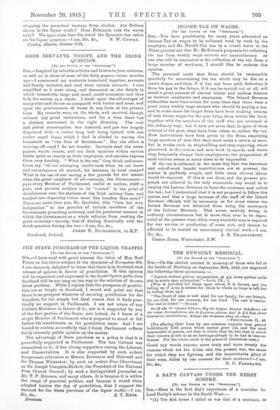IRISH SERVANTS, THRIFT, AND THE DRINK QE ESTI ON.
[To ma Einvoti (3. THE "SPACTLTOR."1 SIR,—Inspired by valuable articles and letters in your columns, as well as in those of some of the daily papers—some months ago—I summoned my moderate household together, servants and family included, and read them certain extracts. I also amplified as I went along, and descanted on the details in which households, large and small, could economize and thus help the nation as a whole. I dwelt upon the itdventagee of margarine and cheese as compared with butter and meat, and upon the grievousness of waste in any form at the present time. My remarks were, on the whole, well received, though without any great enthusiasm, and for a time there was a distinct movement in the right direction. The coal and petrol consumption was lessened, and gas was largely dispensed with--a rather long hall being lighted with one rather small lamp. which I find is alluded to among the household as "the Star of Bethlehem." But the effect is wearing off—and I do not wonder. Servants read the news- papers, watch events, and can form opinions within certain limits quite as clearly as their employera, and can also express them very forcibly. " What is the use," they think and some- times say, "of our scrimping candle-ends when we see waste and extravagance all around; for instance, in local camps P What is the use of our saving a few pounds for our master when the great employer of all—namely, the Government— pays every Member of Parliament, useful or useless, £400 a year, and permits soldiers to be `treated' to the point of drunkenness near the stations of the Irish railway lines, and hustled into departing trains more like bundles than men?" There are more than you, Mr. Spectator, who " turn hot with indignation" at the paradox of certain members of the Government preaching economy, and the persistent manner in which the Government as a whole refrains from making the great economy—namely, that of dealing drastically with the drink question during the war.—I am, Sir, &o., Besabrook, Ireland. JAMES N. RICRiRDSON,














































 Previous page
Previous page